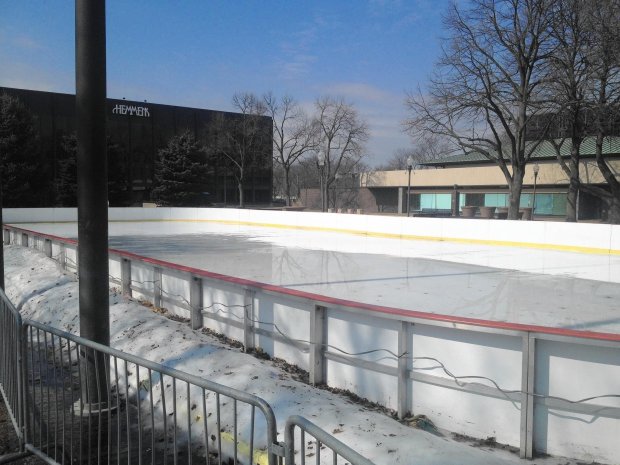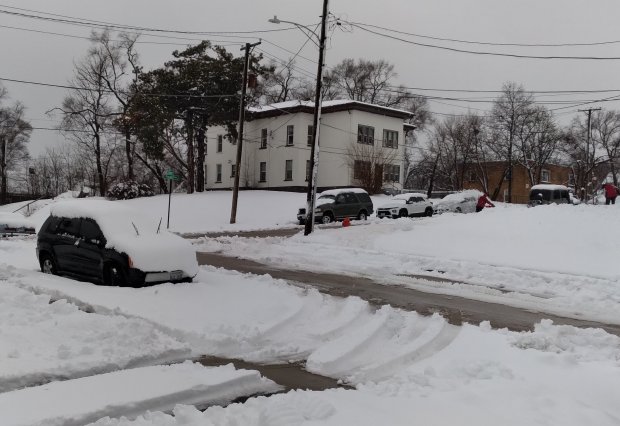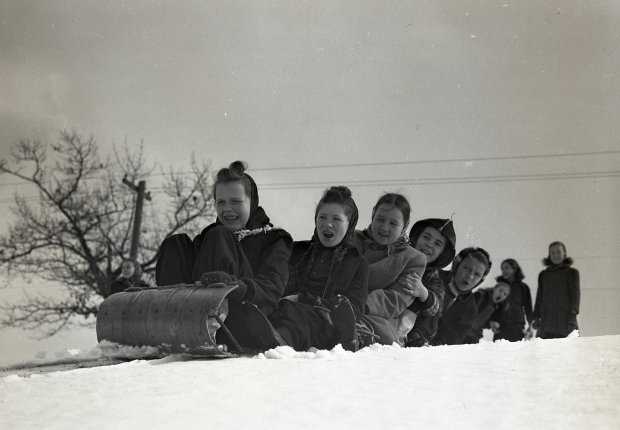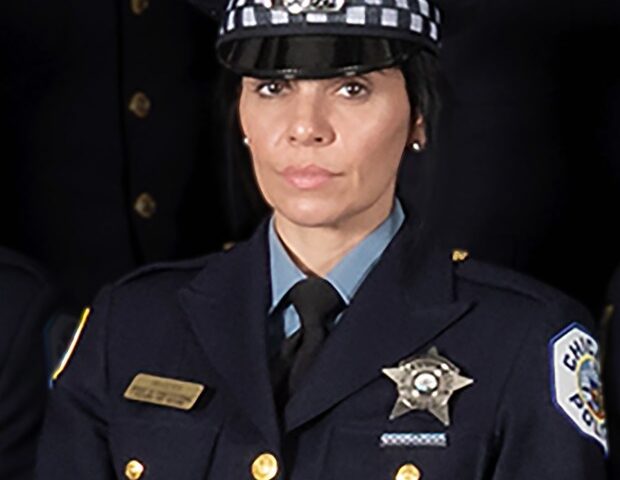There once was a time when the Elgin area was a hotbed of cold weather fun.
Lords Park’s lagoons were used for skating when they froze over and Wing Park had two skating areas — one in the parking lot at Wing Street and the other on a grassy area north of the golf course clubhouse. City employees would use water from a hose to create the frozen ponds.
Elgin City Councilman Scott Thoren, 68, has fond memories of using his sled at the Elgin Country Club, where his parents were members.
“We went sledding there, and they had plenty of hot cocoa for us kids. The parents stayed inside and enjoyed cocktails,” Thoren said. “I remember using a new invention there called a Snurfer. It turned out to be a precursor of the snowboard.”
Are those days gone forever? It’s hard for experts to say with certainty, but with recent winters no longer having long stretches of below-freezing temperatures for ice rinks and snow melting almost as quickly as it arrives, it’s a fairly safe bet most kids no longer have a pair of skates tucked away in their closets and likely use their sleds once or twice a year.
This year is a good example. Unheard-of temperatures in the 50s this week and next are unlike the Februaries most older Elgin residents remember. In fact, the last few winters have been abnormally temperate.
Allison Michaelis, an assistant professor in the Department of Earth, Atmosphere and Environment at Northern Illinois University in DeKalb, says the Midwest is on track for having its warmest winter since the early 1900s.
“It is difficult to say what the contribution of climate change is to this one winter season,” Michaelis said. “We have also been in an El Niño ENSO phase this winter, which typically brings warm and dry conditions to our area.”
The general consensus based on climate change research indicates that we should expect an increase in extremes, she said. Wetter regions will be getting wetter, drier regions drier and more drastic weather events will be occurring with more frequency, she said.
The changes have some thinking that memories of skating and sledding in Elgin are being relegated to the past.
One event that used to bring hundreds of skaters and thousands of spectators to the city between 1923 and the 1950s were the skating races held on the Lords Park lagoon. An Elgin History Museum video narrated by Krisilee Murphy, Elgin Area Convention & Visitors Bureau’s executive director, recalls those cold but enjoyable events.
The public used the ice there too, Thoren said.
“I skated at Lords Park. It was great,” he said, noting that “Sportsman Lodge on West Chicago Street and Maurey’s on National Street were very popular places for kids to get used skates at great prices.”

What ended skating there was not the weather, Thoren said, but salt-contaminated runoff from the housing developments that grew up around the park and changes in the creek water flow that kept them from freezing.
Sledding ended at the country club, he said, because nonmembers using the property began causing problems.
“It wrecked it for the members’ kids. We even drove snowmobiles on the course,” Thoren said. “We respected the course, especially the putting greens, but outsiders caused damage. Now it’s banned for all.”
Elgin Mayor Dave Kaptain, 76, remembers skating at both Lords and Wing parks. The latter park’s ice rinks were tradition through the 1970s, he said.
More recently, the city had a downtown skating rink in Civic Center Plaza between Elgin City Hall and The Hemmens Cultural Center. It was last used in 2019.
With the plaza and the Hemmens being remodeled and the rink past its prime, the Elgin City Council opted to do away with.
Kaptain said the rink was expensive to operate and required the use of city hall’s air-conditioning chillers to keep it frozen. Used by about 3,500 skaters, the city paid $18,650 to run it in its last year and took in $11,460 from skate and rink rentals and skating lessons.
Opening a new rink at some point in the future is not out of the question, the mayor said, but it will require a synthetic polymer surface.
Dundee Township Park District last offered outdoor ice skating was in 2022 at Prairie Meadows Park in West Dundee, Executive Director Dave Peterson said.
In addition to a main rink, which in warmer weather is used for roller hockey, employees would flood a basketball court to create skating ice for smaller children, he said.
“We do very little outdoor winter activities,” Peterson said. “The last I can remember any consistency in weather from winter to winter may have been a stretch in the 1970s when I was just a kid.”
These days the district’s only nod to the season, other than the holiday-themed Winterfest at Randall Oaks Zoo in December, is the annual Frozen 5K race in Randall Oaks Park in February, he said.
The village of South Elgin has held An Almost Winter Day event annually since 2001, but the weather doesn’t always cooperate, especially in the last few years, village communications specialist Craig Pierce said.
In 2021, temperatures hit 70, making the ice sculptor’s job a challenge, and a year later, when they hoped to hold a rained-out summer fireworks and drone show as part of the event, it was too cold and windy, Pierce said.
“With temperatures in the teens and high winds that day, the fireworks were canceled, and the temps dropped too low to operate the drones,” he said. “On the other hand, the 2023 event couldn’t have been a more splendid day. Perfect weather.”
Since 2021, the South Elgin Parks and Recreation team has handed out free ice cream and pancakes in Panton Mill Park for National Ice Cream for Breakfast Day.
“We’ve had subzero temperatures in the past,” Pierce said. “This year’s temperatures reached the 40s and our supply of 150 free breakfasts was gone within 15 minutes.”
The Forest Preserve District of Kane County tries to be ready for a wide range of weather these days by having outdoor programs that can move indoors as needed, said Brittany Kovach, the district’s communications and marketing coordinator.
The big change in winter weather is the gradual upward shift in temperatures and downward shift in total snow amounts, Kovach said.
“We’ve offered naturalist-guided snowshoe hikes for the past four winters, and only two of the 14 planned session dates had enough snow to actually execute the programs,” she said.
With Midwest winters seeming to start later and end earlier, there has been a definite impact on its most popular outdoor festival, Maple Sugaring Days.
“As recently as 10 years ago, trees were tapped and the festival scheduled for mid-March,” she said. “This year, Maple Sugaring Days have been moved up to March 2 and 3. The maple sap has been running since early February, a full four weeks earlier than average. We might need to move the festival to February in future years.”

Jason Johnson, the district’s natural resource manager, said the weather is also making them change how they handle outdoor maintenance work.
“Frozen ground allows us to use machinery without damaging the ground in our natural areas,” he said. “The lack of leaves makes for better visibility. Snow cover allows us to safely burn piles of cut material, and it’s just more comfortable running chainsaws when the temps are low.”
Since November 2021, the East Dundee Library has been letting cardholders borrow snowshoes — they have two sets for adults and two for children.
So far this year, they’ve been checked out twice, library spokesperson Kirstin Finneran said. In the three years they’ve had them, they’ve been used just 21 times total.
Mike Danahey is a freelance reporter for The Courier-News.




